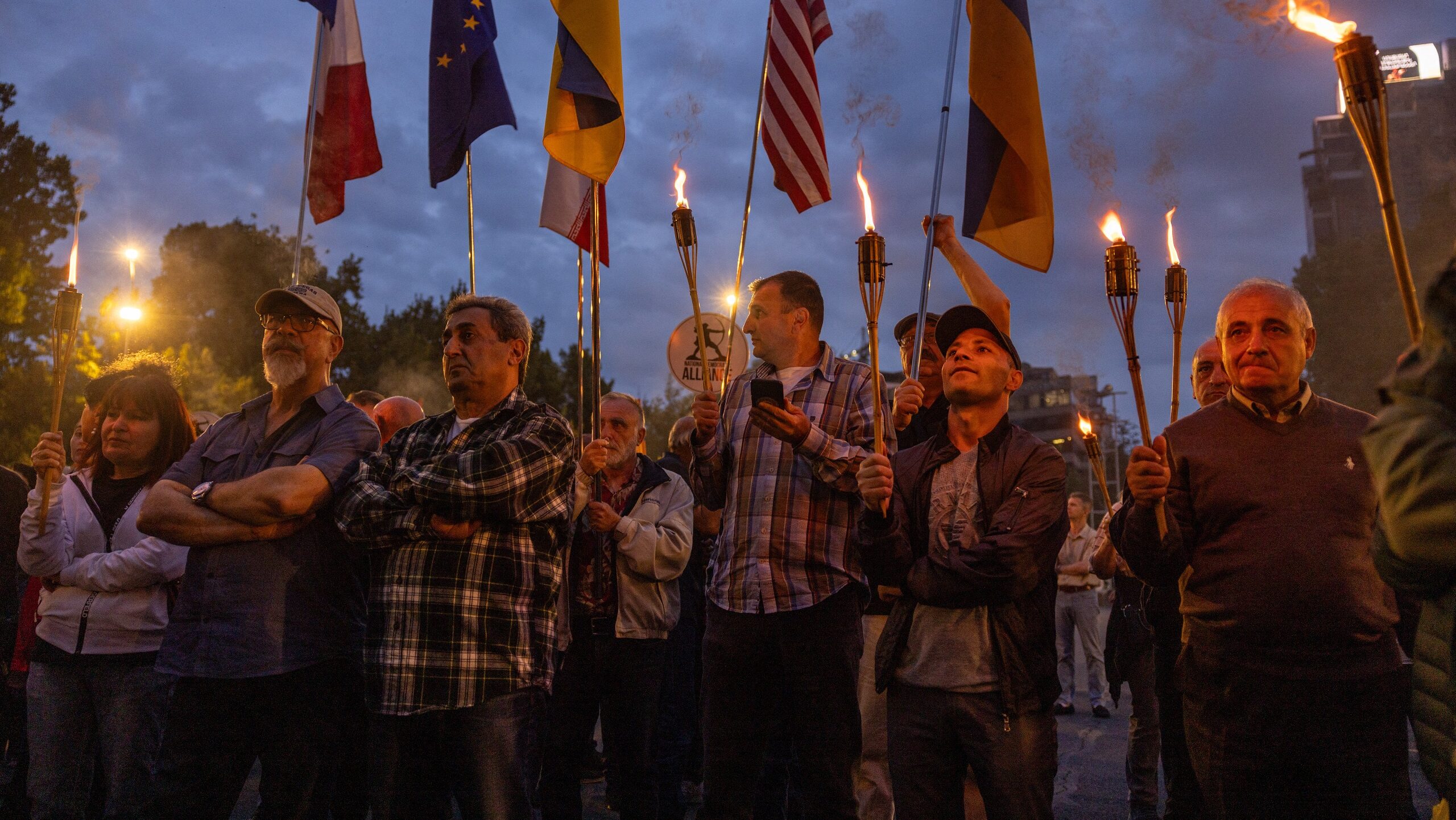One Year After Cease-fire, Nagorno-Karabakh Conflict Still Shapes Azerbaijan-Armenia Relations
Despite the largely maintained cease-fire, peace negotiations are still underway, with both sides accusing each other of undermining the process
September 20 marks one year since Azerbaijan and Armenia signed a cease-fire after Azerbaijan recaptured Nagorno-Karabakh from Armenian forces. The conflict still shapes the relationship between the two countries and their global standing.
Although the cease-fire holds, peace negotiations continue, with both sides accusing each other of undermining the process.
“Since Azerbaijan initiated the peace talks, we are very much interested in the process being a success,” Elchin Amirbayov, a special adviser to Azerbaijan President Ilham Aliyev, told The Media Line. “We see that Armenia does not display any serious signs that they are interested in completing this process. They are, in our opinion, basically engaged in procrastination.”
Azerbaijan argues that peace cannot be finalized unless Armenia removes a constitutional clause referencing its unification with Nagorno-Karabakh, which Azerbaijan sees as a territorial claim, according to Amirbayov.
Armenian Ambassador to Israel Arman Akopian offered a different view. He told The Media Line that Armenia was ready to sign the peace treaty immediately, citing recent statements from the prime minister and foreign minister.
On September 19, the Armenian Foreign Ministry issued the following statement: “The position of the Republic of Armenia over ensuring stability in South Caucasus is unambiguous: swift establishment of peace and relations based on the respect of sovereignty and territorial integrity, and the vision of ensuring sustainable development in the region, effective interconnectivity and prosperity.”
According to the ambassador, the delay stems from Azerbaijan’s request to amend the Armenian constitution, which could take at least two years.
These artificial obstacles to achieving lasting peace in our region raise serious concerns about Azerbaijan’s true intentions
“These artificial obstacles to achieving lasting peace in our region raise serious concerns about Azerbaijan’s true intentions and plans,” the ambassador said.
Amirbayov expressed optimism that the two countries could move beyond their rivalry, saying, “Armenia and Azerbaijan have a unique and historic chance to seize this window of opportunity” to achieve peace and become good neighbors.
He added that “with time, we will not consider each other adversaries,” further emphasizing that peace would allow Armenia to become more integrated into the region, leading to increased prosperity for everyone involved.
Diplomatic relations between Armenia and Turkey remain officially nonexistent, largely due to the 1915-1916 Armenian genocide and other historical tensions.
Give the gift of hope
We practice what we preach:
accurate, fearless journalism. But we can't do it alone.
- On the ground in Gaza, Syria, Israel, Egypt, Pakistan, and more
- Our program trained more than 100 journalists
- Calling out fake news and reporting real facts
- On the ground in Gaza, Syria, Israel, Egypt, Pakistan, and more
- Our program trained more than 100 journalists
- Calling out fake news and reporting real facts
Join us.
Support The Media Line. Save democracy.
Historically part of Azerbaijan, Nagorno-Karabakh became an autonomous region within Azerbaijan during the Soviet period, with a majority Armenian population.
In the late 1980s, Armenia demanded that Nagorno-Karabakh be transferred from Azerbaijan, a demand Azerbaijan rejected, leading to violence. After the Soviet Union’s collapse in 1991, the conflict escalated into a full-scale war, with Armenian forces occupying Nagorno-Karabakh and seven adjacent province.
The first war lasted until a 1994 cease-fire, which held for 26 years. Around 20% of Azerbaijan’s internationally recognized territory was under Armenian occupation, displacing nearly 1 million Azerbaijanis, who became refugees and internally displaced persons.
In 2020, a second war broke out in Karabakh, lasting 44 days and allowing Azerbaijan to reclaim most of the occupied territory. In December 2022, Azerbaijan closed the land corridor between Armenia and the remaining Armenian-controlled area, citing its use for weapons transfers. Nine months later, Azerbaijan launched a one-day military operation to fully reclaim the territory.
When Azerbaijan regained control of Nagorno-Karabakh, it found the territory in ruins. Amirbayov described it as “pillaged and contaminated with landmines and UXOs [unexploded ordnances].” He said Azerbaijan faced a daunting rebuilding task, but the government had been working on large-scale restoration efforts since the 2020 cease-fire.
The land must be cleared of explosives before schools and homes can be rebuilt. Amirbayov noted that Nagorno-Karabakh’s contamination makes Azerbaijan one of the most heavily mined countries in the world. Despite four years of demining efforts, only 13% of the contaminated 11,600-square-kilometer (4,480-square-mile) area—roughly the size of Lebanon—has been cleared.
Azerbaijan has also begun resettling its people in the reclaimed territory. So far, around 8,000 people have returned
“I think we are on the right track,” Amirbayov said. “The government is allocating significant funds to finance this reconstruction effort. Of course, those 8,000 people who are back in their homes moved into newly built residential areas. They are very happy because their dream came true, and by restoring sovereignty over all of its territory, Azerbaijan achieved historical justice.”
The UN Security Council passed four resolutions calling for Armenia to withdraw from Azerbaijani territory.
Meanwhile, tens of thousands of Armenians who fled Nagorno-Karabakh last year are struggling with housing and job security, according to the Armenian Foreign Ministry.
“One year ago, on September 19, the entire indigenous population of Nagorno-Karabakh, over 115,000 Armenians, was forced to abandon its own settlements within a few days as a result of a military attack by Azerbaijan,” the ministry said in a statement. “This displacement, which was the final phase of the policy of ethnic cleansing, happened during the UN General Assembly session when the entire international community was once again discussing the imperative of peaceful resolution of conflicts, establishment, and development of stability, condemning the manifestations of use of force and violations of international norms and human rights in various corners across the world.”
Amirbayov claimed that Armenian civilians were not forced out of Nagorno-Karabakh but were encouraged to stay by Azerbaijan.
Relationship with Israel
Many analysts draw parallels between the Azerbaijan-Armenia conflict and the Israeli-Palestinian issue. Azerbaijan and Israel have maintained official and positive relations for decades.
“We have a very vibrant relationship of friendship based on mutual respect for each other’s interests,” Amirbayov said. He emphasized how Israel has contributed to Azerbaijan’s restoration efforts in Nagorno-Karabakh and expressed interest in more private Israeli companies joining these efforts.
What makes our relationship particularly strong is that it’s a people-to-people relationship
“I think Israel and Azerbaijan have tested their friendship for decades. Today, the level and quality of political dialogue and cooperation, in general, are at their highest,” Amirbeyov added. “What makes our relationship particularly strong is that it’s a people-to-people relationship. Azerbaijan is home to one of the largest Jewish communities, and they serve as a living bridge between our peoples. These people have lived happily in our country, free from discrimination or antisemitism.”
The World Jewish Congress estimates that around 7,200 Jews live in Azerbaijan.
Israel is one of Azerbaijan’s leading arms suppliers. However, earlier this week, Azerbaijan voted in favor of a Palestinian Authority resolution at the UN Security Council calling for Israel to withdraw from the West Bank, considered by many religious Jews to be the biblical heartland, within 12 months.
Amirbayov said he was unfamiliar with the specific resolution but emphasized that Azerbaijan consistently supports efforts to end military confrontations. “What is important is to try to stop the loss of human life,” he said.
Armenia also voted for the Palestinian Authority resolution and officially recognized Palestine as a state in June, despite Israel’s stance that granting statehood after the Hamas massacre would reward terrorism.
“The Israeli Ministry of Foreign Affairs reacted predictably negatively to Armenia’s recognition of the Palestinian state earlier this year. However, we do not see this as an obstacle to strengthening relations between our two countries,” Akopian explained. “Israel maintains excellent, even strategic, relationships with many countries—including those in our region—that recognized Palestine long before Armenia, and often with much stronger language.”
He added, “From our perspective, a significant obstacle is the fact that Armenia remains the only country in our region where Israel has not established an embassy. This is particularly difficult to comprehend, given the many striking similarities between our peoples and countries, as well as our shared values of civil liberties and democracy.”
Both Azerbaijan and Armenia maintain ties with Iran, though Azerbaijan’s relations with Tehran have been strained in recent years due to its support for Armenia in the Nagorno-Karabakh conflict. When asked if Azerbaijan would allow Israel to use its territory or provide support in a potential attack on Iran, Amirbayov declined to comment.
“I don’t want to speculate on those terrible scenarios,” he said. “I sincerely hope this region will not be plunged into another source of instability.”




